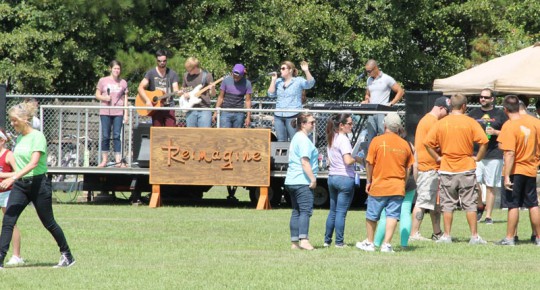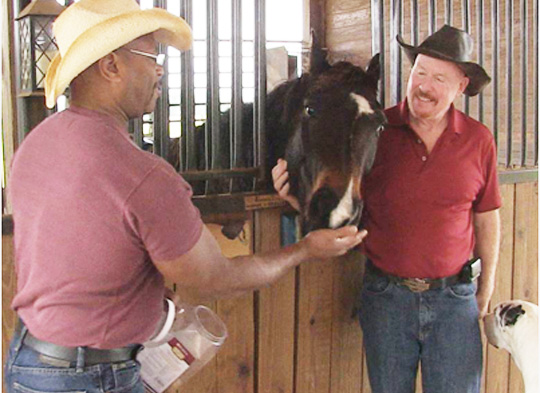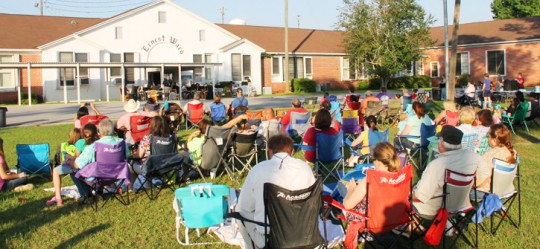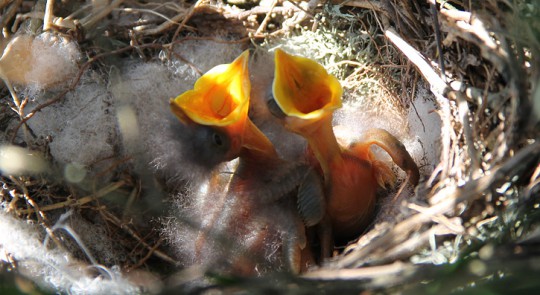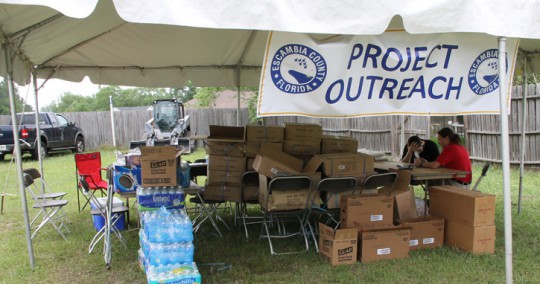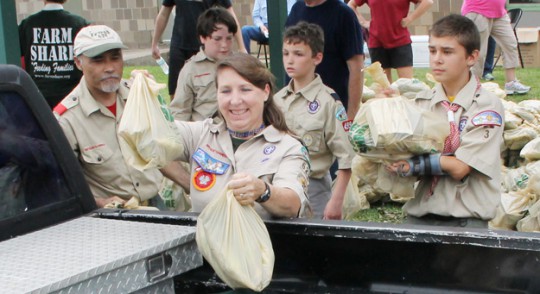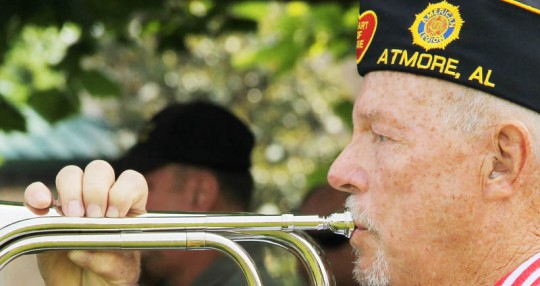Reimagine Century To Return In 2015
December 31, 2014
Reimagine Century will return in 2015, organizers announced Tuesday night.
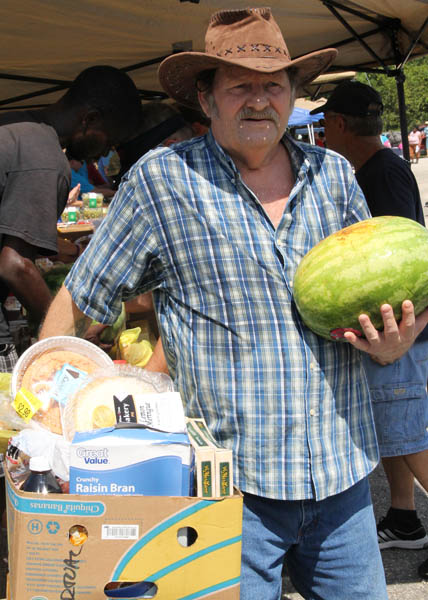 Community agencies, businesses, churches and others will come together on Saturday, May 16 to help the needy in Century and surrounding areas. Activities planned include a food giveaway, clothing giveaway, free haircuts and manicures, free laundry detergent and much more.
Community agencies, businesses, churches and others will come together on Saturday, May 16 to help the needy in Century and surrounding areas. Activities planned include a food giveaway, clothing giveaway, free haircuts and manicures, free laundry detergent and much more.
“The Century community and surrounding areas are such a blessing to all who visit. This was the sentiment of every church, business, community service organization, and ministry during the first Reimagine Century event held last year in September that all who were involved would like to return for the 2015 event,” Linda English, event organizer, said.
Anyone that wishes to be involved in the event is invited to a volunteer meeting on Tuesday, February 10 at the Century Community Center at the corner of West Highway 4 and Industrial Boulevard.
Pictured: The first Reimagine Century event last September. NorthEscambia.com photos, click to enlarge.
New Year’s Holiday Closures
December 31, 2014
The following is a listing of the closures in Escambia County for the New Year’s holiday.
Closed Thursday, January 1
The following offices will be closed:
- Escambia County Board of County Commissioners
- Escambia County Clerk of the Circuit Court and Comptroller, all locations
- Escambia County Property Appraiser
- Escambia County Supervisor of Elections
- Escambia County Tax Collector
- Escambia County Area Transit (ECAT)
- West Florida Public Library System
- Town of Century, all offices
Closed Friday, January 2
The following offices will be closed:
- Escambia County Board of County Commissioners
- Escambia County Clerk of the Circuit Court and Comptroller Finance, Official Records and Clerk to the Board offices. All other locations will be open
- Escambia County Property Appraiser
- Escambia County Supervisor of Elections
- Escambia County Tax Collector
- Escambia County Area Transit (ECAT), administrative offices only
- West Florida Public Library System
Exceptions:
- Escambia County 911 Dispatch, EMS and Fire Services are open daily to serve our citizens
- Perdido Landfill, excluding the administrative offices, will reopen on Friday, January 2
Escambia County Area Transit (ECAT) Schedule Changes:
- ECAT buses will not run Thursday, January 1. Regular bus services will resume on Friday, January 2
- UWF Trolley will not run between Saturday, December 13 and Sunday, January 4.
- UWF Trolley service will resume on Monday, January 5
- For assistance or customer service, please contact ECAT at (850) 595-3228
Gay Marriage Fight Finds Unlikely Home In Chipley, Rural Panhandle
December 31, 2014
Stephen Schlairet and Ozzie Russ have almost as much in common with their neighbors in the tiny Panhandle community of Chipley as the way of life that sets them apart.
They raise horses and dogs. They live on a 20-acre spread on the outskirts of town. They lend a hand for the annual back-to-school fundraiser. They help out with the United Way. They wear cowboy hats.
Schlairet and Russ are also an interracial couple. They’re gay. And they’re at the center of a heated legal battle over same-sex marriage, banned by Florida voters who put a prohibition into the state constitution six years ago.
The court fight has put Washington County, with a population of about 24,000 and with almost twice as many miles of dirt roads as paved streets, at the forefront of what some — including Schlairet and Russ — consider the most pressing civil-rights issue in the country today.
Sitting side-by-side in their spacious home, Schlairet and Russ are a typical couple in many ways. They finish each other’s sentences, and reminisce over a photo album of their commitment ceremony nearly 15 years ago, a lavish affair on a yacht in Fort Lauderdale where both men wore white tuxedos.
 They moved to Chipley, home to about 2,000 residents, a decade ago after Schlairet, now retired, got a job as an administrator at a local hospital.
They moved to Chipley, home to about 2,000 residents, a decade ago after Schlairet, now retired, got a job as an administrator at a local hospital.
Their presence in what they called a “sheltered” community over the years may have helped to open hearts and minds in one of the state’s most conservative, Christian regions, if not to gay marriage, then perhaps to tolerance of a different kind of love than most of their neighbors had ever encountered before they met Schlairet and Russ.
“A lot of people have not stepped outside of this box that they live in. We’re bringing something new to them and something that’s not what they see on TV or what people tell them about who we are. I think what changed their minds about us was actually having us in their presence to see us, and hear us, and be around us. …We’ve kind of opened their eyes,” Russ said.
Schlairet, 66, and Russ, 48, said they became plaintiffs in a lawsuit challenging Florida’s same-sex marriage ban not only so they could be legally wed, but to help pave the way for millions of others as well.
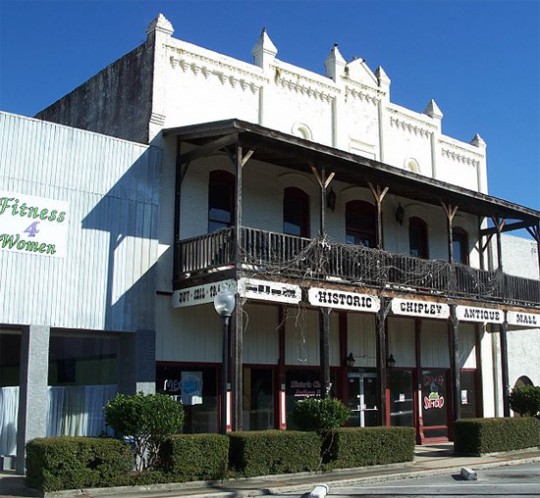 “It isn’t just that, though. It is the validation of our relationship. It is the validation that our feelings are just as important as yours. Isn’t it Shylock in Shakespeare who says when you prick me, do I not bleed? What was he talking about? He wanted to be considered equal to other people. That’s what this is. This is a civil rights issue for us,” Schlairet, wearing a leather cowboy hat and a Harley-Davidson belt buckle, said during an interview this week at their home.
“It isn’t just that, though. It is the validation of our relationship. It is the validation that our feelings are just as important as yours. Isn’t it Shylock in Shakespeare who says when you prick me, do I not bleed? What was he talking about? He wanted to be considered equal to other people. That’s what this is. This is a civil rights issue for us,” Schlairet, wearing a leather cowboy hat and a Harley-Davidson belt buckle, said during an interview this week at their home.
U.S. District Judge Robert Hinkle in August ruled that the state’s ban on same-sex marriages is unconstitutional and ordered the Washington County clerk of court to issue a marriage license to Schlairet and Russ. But Hinkle at the same time put a hold on his ruling pending appeals in other cases. Hinkle’s ruling prompted Attorney General Pam Bondi to file a series of appeals, including a request to the U.S. Supreme Court to extend the stay. The high court refused, and the stay is set to expire at the end of the day Monday, meaning that Schlairet and Russ can obtain their marriage license next week.
Washington County clerk of court Lora Bell last week filed an emergency motion with Hinkle saying she would comply with the order to allow Schlairet and Russ to wed but asking for clarification about whether she would have to issue marriage licenses to other same-sex couples.
Lawyers representing gay couples in the lawsuit argue that Hinkle’s ruling applies to all 67 counties.
Schlairet and Russ, meanwhile, say they likely won’t get married on Jan. 6 because they want time to plan a wedding, although they will obtain a marriage license, which they would have 60 days to use.
For all the attention the federal lawsuit is getting elsewhere in the state and even around the country, Washington County residents seemed almost indifferent about the case, even though the majority of those questioned Monday objected to the idea of gay marriage, almost exclusively for religious reasons.
The rural Panhandle county is peppered with hay fields interspersed with oak trees dripping Spanish moss. Churches nuzzle up to horse pastures adjacent to mobile homes or sprawling ranch homes, all in various states of repair.
A few miles down the road from Schlairet and Russ’ home, the pastor of an Assembly of God church at first refused to speak with a visitor who is not a Christian, before trying to convert her.
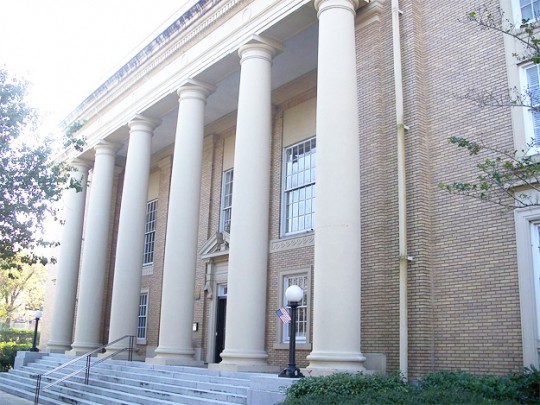 Outside a Wal-Mart on a drizzly, gray afternoon, most shoppers approached by The News Service of Florida who were willing to talk shared the same opinion as Larry Brese, an 80-year-old Baptist who lives in Chipley.
Outside a Wal-Mart on a drizzly, gray afternoon, most shoppers approached by The News Service of Florida who were willing to talk shared the same opinion as Larry Brese, an 80-year-old Baptist who lives in Chipley.
“It goes against the Bible,” Brese said. But when asked if the issue was dividing the community, Brese said, “I haven’t heard anybody talking about it.”
Marvin Peterson, 87, agreed.
“I don’t think the good Lord wanted them to be that way. To me, that’s not love,” Peterson said.
Viki Macys said she moved to nearby Sunny Hills three years ago from Chicago to care for her ailing father.
“It’s better to love somebody than to hate somebody,” Macys said, but added, “I don’t really believe in gayness. I just don’t. I think it’s against God.”
Beverly Harris said she was not opposed to the idea of same-sex couples getting married.
“It’s their life,” Harris said. “If they want to live like that, that’s their business. As long as they don’t make a big thing out of it in public. Who’s to judge?”
But she said that most of her neighbors did not share her view.
“I’m very open about things. I wish they were more open,” Harris said.
Despite their misgivings about gay marriage and homosexuality, the people interviewed appeared almost nonchalant about the controversy brewing in their midst.
“Judge not, lest ye be judged,” one elderly man who refused to give his name said. “Especially in a free country.”
 Main Street in the historic downtown area emanates a shabby charm found in similar small towns throughout North Florida. A post office, a florist shop and a restaurant or two are squeezed in among a growing number of vacant storefronts.
Main Street in the historic downtown area emanates a shabby charm found in similar small towns throughout North Florida. A post office, a florist shop and a restaurant or two are squeezed in among a growing number of vacant storefronts.
Pamela Harris, the owner of “Everything Must Go” on Main Street, said she was unaware of the gay marriage lawsuit until Sunday, when she heard about it at church.
“A lot of people are upset about it,” Harris said. “I’m not upset about the fact that they want to do that. I’m upset that they’re ignorant of the word of God. It’s just an abomination to God.”
Schlairet and Russ insist they have not suffered any retribution because of the lawsuit but instead have been surprised by the support they have received, especially from parents whose children are gay or lesbian and from gay veterans.
“This is where we live. We hope to shape this community for the better in whatever little part we can do. We’re not activists. We’re not. We’re just ordinary people that saw that something that was wrong. We had an opportunity to fix it. So we said OK, put our name on it,” Schlairet said.
The couple never envisioned getting married until they were asked to join the lawsuit earlier this year, Russ said.
“We thought we were going to have the commitment ceremony, be together, live and die. It feels good to have this effect, that we’re able to make a change,” Russ said.
For Schlairet, the lawsuit is a chance to shape history.
“A lot of people during the civil-rights era had the opportunity to stand up and say something and they didn’t. This for us was an opportunity. I didn’t want to have to, when I get to the end, have to say I had a chance once in my life when I could have made a difference but I copped out. That was important to me,” he said.
by Dara Kam, The News Service of Florida
Pictured top: Ozzie Russ and Stephen Schlairet feed one of the horses on their Washington County farm near Chipley. Photo by Tom Urban. Additional photos for NorthEscambia.com, click to enlarge..
Tips From The IRS On Year-End Gifts To Charity
December 31, 2014
The Internal Revenue Service today reminded individuals and businesses making year-end gifts to charity that several important tax law provisions have taken effect in recent years. Some of the changes taxpayers should keep in mind include:
Rules for Charitable Contributions of Clothing and Household Items
 Household items include furniture, furnishings, electronics, appliances and linens. Clothing and household items donated to charity generally must be in good used condition or better to be tax-deductible. A clothing or household item for which a taxpayer claims a deduction of over $500 does not have to meet this standard if the taxpayer includes a qualified appraisal of the item with the return.
Household items include furniture, furnishings, electronics, appliances and linens. Clothing and household items donated to charity generally must be in good used condition or better to be tax-deductible. A clothing or household item for which a taxpayer claims a deduction of over $500 does not have to meet this standard if the taxpayer includes a qualified appraisal of the item with the return.
Donors must get a written acknowledgement from the charity for all gifts worth $250 or more. It must include, among other things, a description of the items contributed.
Guidelines for Monetary Donations
A taxpayer must have a bank record or a written statement from the charity in order to deduct any donation of money, regardless of amount. The record must show the name of the charity and the date and amount of the contribution. Bank records include canceled checks, and bank, credit union and credit card statements. Bank or credit union statements should show the name of the charity, the date, and the amount paid. Credit card statements should show the name of the charity, the date, and the transaction posting date.
Donations of money include those made in cash or by check, electronic funds transfer, credit card and payroll deduction. For payroll deductions, the taxpayer should retain a pay stub, a Form W-2 wage statement or other document furnished by the employer showing the total amount withheld for charity, along with the pledge card showing the name of the charity.
These requirements for the deduction of monetary donations do not change the long-standing requirement that a taxpayer obtain an acknowledgment from a charity for each deductible donation (either money or property) of $250 or more. However, one statement containing all of the required information may meet both requirements.
Reminders
The IRS offers the following additional reminders to help taxpayers plan their holiday and year-end gifts to charity:
- Qualified charities. Check that the charity is eligible. Only donations to eligible organizations are tax-deductible. Select Check, a searchable online tool available on IRS.gov, lists most organizations that are eligible to receive deductible contributions. In addition, churches, synagogues, temples, mosques and government agencies are eligible to receive deductible donations. That is true even if they are not listed in the tool’s database.
- Year-end gifts. Contributions are deductible in the year made. Thus, donations charged to a credit card before the end of 2014 count for 2014, even if the credit card bill isn’t paid until 2015. Also, checks count for 2014 as long as they are mailed in 2014.
- Itemize deductions. For individuals, only taxpayers who itemize their deductions on Form 1040 Schedule A can claim deductions for charitable contributions. This deduction is not available to individuals who choose the standard deduction. This includes anyone who files a short form (Form 1040A or 1040EZ). A taxpayer will have a tax savings only if the total itemized deductions (mortgage interest, charitable contributions, state and local taxes, etc.) exceed the standard deduction. Use the 2014 Form 1040 Schedule A to determine whether itemizing is better than claiming the standard deduction.
- Record donations. For all donations of property, including clothing and household items, get from the charity, if possible, a receipt that includes the name of the charity, date of the contribution, and a reasonably-detailed description of the donated property. If a donation is left at a charity’s unattended drop site, keep a written record of the donation that includes this information, as well as the fair market value of the property at the time of the donation and the method used to determine that value. Additional rules apply for a contribution of $250 or more.
- Special Rules. The deduction for a car, boat or airplane donated to charity is usually limited to the gross proceeds from its sale. This rule applies if the claimed value is more than $500. Form 1098-C or a similar statement, must be provided to the donor by the organization and attached to the donor’s tax return.
If the amount of a taxpayer’s deduction for all noncash contributions is over $500, a properly-completed Form 8283 must be submitted with the tax return.
More Medical Marijuana Delays?
December 31, 2014
Lawmakers will have to sign off on a new rule to kick-start the state’s nascent medical marijuana industry, meaning another likely delay in the law that was supposed to take full effect Thursday.
Office of Compassionate Use Director Patricia Nelson, who took over the state Department of Health post earlier this month, told an audience gathered for a workshop Tuesday in Orlando that the rule would require the Legislature’s blessing because costs associated with the new law are growing.
 To be eligible for one of five state licenses to grow, process and distribute strains of non-euphoric marijuana, nurseries will likely have to make significant investments in “high-ticket” items like analytical equipment, expert consultants, security operations and procuring the $5 million performance bonds required in the law, Nelson said.
To be eligible for one of five state licenses to grow, process and distribute strains of non-euphoric marijuana, nurseries will likely have to make significant investments in “high-ticket” items like analytical equipment, expert consultants, security operations and procuring the $5 million performance bonds required in the law, Nelson said.
Nelson told nursery owners, investors and lobbyists gathered for the meeting that she needed estimates from them to calculate the anticipated impact of the rule. Florida law requires the Legislature to ratify rules that cost in excess of $1 million over five years. Nelson said she anticipates that the combined costs for businesses to operate the cannabis industry and for the state to regulate it would exceed $1 million over five years, triggering ratification.
“We have to have that before these rules will be effective. That requires an actual bill. It’s not something that can be done by committee. That bill has to be passed by both chambers and then signed by the governor,” Nelson said.
Nelson did not say when proposed rule language would be released but said that “it won’t be long” because she wanted to have the rule ready to be implemented by the time the legislative session begins March 3.
“I assume 100 percent that it’s going to be required because of the costs that are going to be associated with these rules,” she said. “If we can’t finish this by the time the Legislature gets in town, then we’re pushing it back a whole ‘nother year.”
Under the law passed by the Legislature and signed by Gov. Rick Scott, doctors on Jan. 1 were supposed to begin ordering strains of cannabis that are low in euphoria-inducing tetrahydrocannabinol, or THC, and high in cannabadiol, or CBD , for patients who suffer from severe spasms or cancer. But, siding with a group of nurseries and other businesses that launched a legal challenge, an administrative law judge in November struck down the health department’s first stab at a regulatory structure, prompting Tuesday’s workshop, the fourth public meeting on the issue since the law was passed.
Administrative Law Judge W. David Watkins agreed with Miami-based Costa Farms and others that objected to the Department of Health’s proposed use of a lottery to pick the licensees.
Watkins also rejected a portion of the proposal that limited applicants to dispensing the substance, usually delivered in a paste or oil form, from the same location where it is grown and processed instead of allowing dispensing organizations to distribute the product from separate retail locations.
Nursery operator Anthony Ardizzone on Tuesday complained about Nelson’s decision to hold another workshop and her failure to provide a draft rule although Watkins laid out the parameters for the regulation in his 71-page order last month.
“It seems like we listen to the same thing over and over again and accomplish not much of anything. I really would like to get this done … but it just seems like we can’t get there,” Ardizzone said.
But Nelson ordered the workshop “to address problems that still exist,” she said.
“If we had come to you with a draft and said here are our rules, how would that have looked at that workshop?” Nelson said.
“I think it would have given us something to talk about,” Ardizzone replied.
“Half of you would have said that. Half of you would have said, ‘They already know what they’re going to do. What are they even having workshops for?’ ” she said. “We’re trying to cut a middle ground. We want to write great rules. We’d like to at the same time to have great public perception of our process. … If we skipped to rules and didn’t go through the rule-making process, first of all it wouldn’t be legal, but second of all, people would wonder who we’re consulting? Who’s writing these rules? Who’s helping them because they clearly couldn’t do this before, how can they do it now?”
 Several speakers urged Nelson to allow operators to have multiple retail locations instead of a dispensing site located on the same premises as the nursery, as the original rule required but which Watkins said was not authorized by the statute.
Several speakers urged Nelson to allow operators to have multiple retail locations instead of a dispensing site located on the same premises as the nursery, as the original rule required but which Watkins said was not authorized by the statute.
“I understand that we now have an order that says we can do all of these things but I am telling you from the perspective of an expert in Florida administrative law certified by the Florida Bar, and I’ve done this for a long time, I would never in a million years have told you that a judge would have said that the phrase ‘reasonable accessibility and availability’ could be interpreted this broadly to allow us this much. Never. But he has. So we have that now,” she said. “We’re in a no-win situation. What we’re trying to do right now is do this as quickly as possible.”
State Rep. Matt Gaetz, a Fort Walton Beach Republican who attended Tuesday’s meeting and who was instrumental in getting the legislation passed during the 2014 session, said he was unconvinced that the rule would require legislative approval.
Even so, ratification may not create a substantial delay, Gaetz said. Because Florida’s low-THC law is unlike any other state’s medical marijuana laws, health officials don’t have a template to borrow when crafting the rule.
“We have to create a uniquely Floridian solution. And we’ll get there,” Gaetz said. “I put a Jan. 1 deadline into the bill because I’m sensitive to the desperation of vulnerable people who need access to cannabis. But these are complex issues and at times it’s better to get it right then to just get it done for the sake of getting it done. I don’t think anyone’s stonewalling. I don’t think anyone’s intentionally delaying. … It’s just not something that’s really comparable to the normal administrative rigmarole.”
by Dara Kam, The News Service of Florida
Tate, Northview Lose In Tate Christmas Tournament
December 31, 2014
 The Tate Aggies lost to Jupiter in the Tate Christmas Tournament Tuesday night.
The Tate Aggies lost to Jupiter in the Tate Christmas Tournament Tuesday night.
Christian Cass led Tate with 13, Michael Roberts added 12, while Jordan Watkins had 9 and Zach Phalen and Jake Henry had 7 each for the Aggies.
Here are the tournament results so far, along with Wednesday’s schedule:
Monday’s Results
- Escambia 73, Northview 65 (OT)
- Jupiter 55, West Florida 42
- Archer 68, Pine Forest 47
Tuesday’s Results
- Pine Forest 67, Northview 56
- Archer 65, Escambia 31
- Pensacola High 45, West Florida 31
- Jupiter 53, Tate 48
Wednesday’s schedule
- Pace vs. Northview - 3 p.m.
- Pine Forest vs. Pace – 4:30 p.m.
- Escambia vs. Tate – 6 p.m.
- Archer vs. Jupiter - 7:30 p.m.
2014 In Photos: May
December 31, 2014
We are looking back at the top events of 2014 in photos. Today, we are featuring photos from May.
Two people were killed and nearly 200 were injured in an explosion at the Escambia County Central Booking and Detention Facility.
Over 2,000 homes and businesses were damaged by flooding. One of the hardest hit areas was the Bristol Park Subdivision.
Gov. Rick Scott and local officials toured flood damage.
The West Florida Lady Jaguars won the 4A state championship in almost impossible grand style. The Lady Jags were down 5-1 with two outs in the seventh, before coming back to beat P. K. Yonge 6-5 in Vero Beach.
Northview High School presented “Shrek The Musical”.
The 40th annual Pen Wheels disabled fishing rodeo was held in Walnut Hill, a project of the Pensacola Fiesta of Five Flags organization.
Warm weather made for a great Field Day at Molino Park Elementary School.
Six people, including two children, were rescued from the flooded Perdido River at Barrineau Park.
The Northview Chiefs outscored the Jay Royals a total of 50-21 during a Spring Jamboree Friday night at Merle North Stadium in Jay.
The Tate High School Concert Bands presented their Spring Concert at Hillcrest Baptist Church.
Fire destroyed the Mt. Carmel United Methodist Church north of Jay.
The Ernest Ward Middle School Chorus and Band held their Spring Concert on the front lawn of the school.
Dozens of performers delighted hundreds of people Saturday night during the 19th annual Heather Leonard Danceworks recital at Northview High School.
Young mocking birds hatched in May at our NorthEscambia.com office.
The track and field portion of the Escambia County Specials Olympics was held at Tate High School after numerous rain delays.
A portion of Highway 97 in Walnut Hill collapsed in an existing 50-foot deep gully.
An afternoon of heavy rain across the North Escambia area gave way to a beautiful sunset above wheat fields in Walnut Hill.
Nearly 5,000 Escambia County residents had applied for FEMA flood aid by the middle of May.
Over 30,000 pounds of food was distributed in Cantonment to hundreds of families in need following the flooding in Escambia County from the non-profit group Farm Share.
About 200 people gathered in Atmore for a Memorial Day service to recognize those that have served and paid the ultimate sacrifice from Atmore, Walnut Hill, Bratt and surrounding areas.
The Niceville Eagles upended the Tate Aggies 21-13 in a two-quarter spring football jamboree at Pete Gindl Stadium in Cantonment.
Northview High School named the Class of 2014’s honor graduates.
Noah James Heintz was named the Class of 2014 valedictorian, while Eion Michael Blanchard was named salutatorian for the Tate High School Class of 2014.
NorthEscambia.com photos, click to enlarge.
Lawsuit Against Florida School Voucher Expansion Thrown Out
December 31, 2014
A challenge to this year’s expansion of the state’s de facto school-voucher program was thrown out of court for a second time Tuesday, likely ending one of two legal threats to the system.
Leon County Chief Circuit Judge Charles Francis dismissed the lawsuit “with prejudice,” which essentially bars the suit from being filed again. The challenge, backed by the Florida Education Association, was seeking to reverse a 2014 law that packed together an expansion of eligibility for the voucher program with several other education measures.
 Francis had ruled in September that the plaintiff in the lawsuit, East Lee County High School teacher Tom Faasse, didn’t have the legal right to file suit against the law unless Faasse could prove that the law specifically hurt him. But Francis gave Faasse a chance to file a new version of the lawsuit, the one that was rejected Tuesday.
Francis had ruled in September that the plaintiff in the lawsuit, East Lee County High School teacher Tom Faasse, didn’t have the legal right to file suit against the law unless Faasse could prove that the law specifically hurt him. But Francis gave Faasse a chance to file a new version of the lawsuit, the one that was rejected Tuesday.
“In order to sustain standing, the plaintiffs are required to allege sufficient facts to support a finding of special injury,” Francis wrote. “As currently pled, the amendment complaint for declaratory judgment also fails to allege a legally sufficient basis to sustain a finding of special injury and the court is of the opinion that further amendments to the complaint will not result in a legally sufficient complaint.”
Francis rebuffed claims by Faasse and two parents who joined the new lawsuit that the expansion of the Tax Credit Scholarship Program hurt them because it could lead to reduced funding for their schools. The program provides tax credits to companies that donate money to nonprofit entities that pay for children to go to private schools.
“We are pleased that Chief Judge Francis granted our office’s motion and upheld the law,” Attorney General Pam Bondi said in a brief statement issued by her office.
The Florida Education Association did not immediately comment on Francis’ action.
In the original lawsuit, Faasse contended that because the legislation at the center of the suit dealt with spending decisions, it could be challenged under the Florida Constitution’s requirement that each bill deals with a single subject.
But Francis sided with the state, which argued that, to fall under the constitutional provision, a lawsuit had to challenge a bill based on a constitutional limit on how the Legislature spends money. Francis said Faasse couldn’t sue just because the law he was challenging had an impact on the budget.
Francis’ rulings don’t affect a separate, broader challenge to the voucher program. That lawsuit, filed in August, draws on a 2006 ruling from the Florida Supreme Court that held the state’s Opportunity Scholarship Program unconstitutional. That program was a purer version of a voucher system, using public money directly to fund private education for some students.
Canceled: 100-Acre Burn Today At Ransom Middle School
December 31, 2014
The burn planned for today has been canceled due to weather conditions, according to the Florida Department of Forestry.
The Florida Forest Service, in conjunction with Ransom Middle School and the Escambia County School Board, is planning a 100-acre prescribed burn for this morning.
After a recent wildfire caused smoke issues near the Cantonment school, the plan is to conduct a burn on county-owned property in order to reduce the risk of future wildfires, eliminate potential smoke issues and allow the school board to better utilize the field adjacent to the school.
 “We’ve had two fires there in the past year,” said Adam Parden, the FFS’s Forest Area supervisor for Escambia County. “This will help eliminate future fires and let the school be able to put their field back in working order.”
“We’ve had two fires there in the past year,” said Adam Parden, the FFS’s Forest Area supervisor for Escambia County. “This will help eliminate future fires and let the school be able to put their field back in working order.”
The field is overgrown with weeds and grass and Forest Service crews already have established fire breaks around the perimeter. With school out of session for the holidays and rain forecast for the weekend, the next two weeks provide an ideal window for this operation. Given the light fuel load of the area, the burn should only take a few hours and smoke is not expected to linger in the area afterward.
The operation is part of the Forest Service’s wildfire mitigation program and will help protect more than $30 million in structures including Ransom Middle School’s facilities.
NorthEscambia.com file photo, click to enlarge.
Silver Alert Canceled For Escambia County Man
December 30, 2014
UPDATE: THIS SILVER ALERT HAS BEEN CANCELED.
A Florida Silver Alert has been issued for a missing Escambia County man.
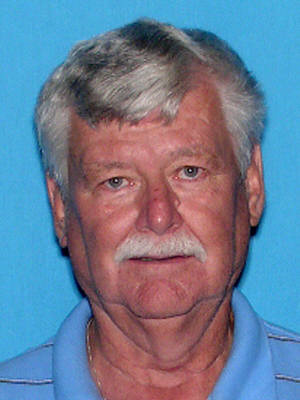 Gary Nickerson, 68, was last seen in Milton and is missing from the Broyhill Lane area of Escambia County. He was last seen waring jeans, a light blue shirt, a black zip-up jacket, a gray shoe on his left foot and a cast on his right foot. He may be traveling in a 2002 silver Nissan pickup truck with Florida tag number I704BP.
Gary Nickerson, 68, was last seen in Milton and is missing from the Broyhill Lane area of Escambia County. He was last seen waring jeans, a light blue shirt, a black zip-up jacket, a gray shoe on his left foot and a cast on his right foot. He may be traveling in a 2002 silver Nissan pickup truck with Florida tag number I704BP.
Anyone with information on his whereabouts should contact the Escambia County Sheriff’s Office at (850) 436-9620 or call 911.
A “Silver Alert” is an alert for missing seniors similar to an “Amber Alert” issued for missing children.




